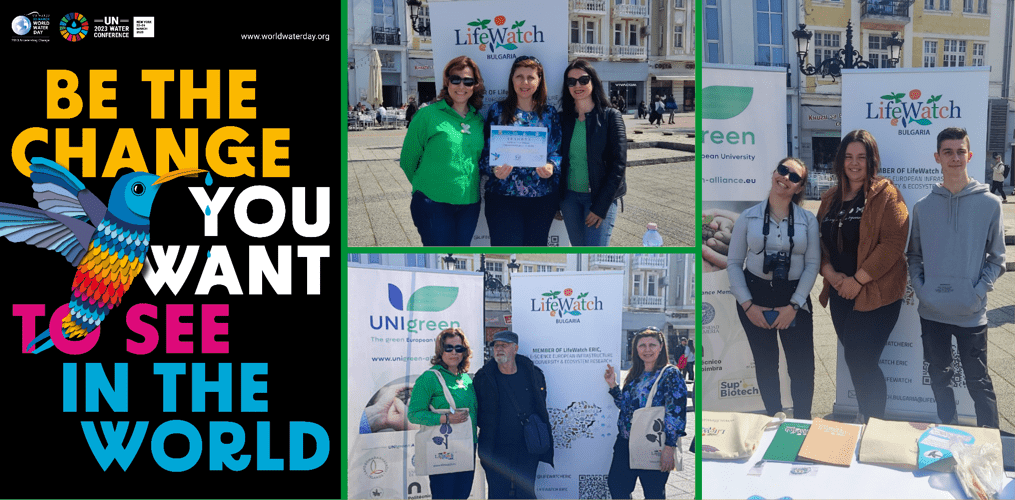
This year, several LifeWatch Bulgaria partners were heavily involved in World Water Day in Plovdiv, observed on 22 March. The LifeWatch Bulgaria Consortium joined in the colourful event, organised by the Municipality of Plovdiv, The Agricultural University-Plovdiv, the Regional Inspectorate of Environment and Water – Plovdiv, “Water Supply and Sewerage” Ltd. – Plovdiv and the East Aegean River Basin Directorate. This year’s theme was “Accelerating Change”, focusing on resolving the global drinking and wastewater crisis. The campaign encourages us to change the way we use and manage water resources. And because water affects us all, we need to take action to make this happen in a reasonable and sustainable way. All of us – everyone.
In fact, there was a big focus on raising awareness through citizen science, showcased by the large number of participants; nearly 400 children from kindergartens, schools and eco-clubs in the city took part in the celebration, with 36 educational institutions, institutions, institutions and organisations participating. Students from Plovdiv schools made models, presentations and drawings related to this year’s motto “Be the change you want to see in the world”. At the end of the celebration, students with the most interesting projects were given prizes.
This year, a tradition was established for the Leader of the Bulgarian LifeWatch Consortium, the Agricultural University-Plovdiv, to celebrate World Water Day. The University had a stand, where lecturers from the Department of Agroecology and Environmental Protection, together with students majoring in Ecology and Environmental Protection, had prepared a quiz with facts about water. During the event, all curious people were presented with experiments through which they were acquainted with some of the properties of water.
The Green Balkans Organisation, a partner of the Bulgarian LifeWatch Consortium, also took part in the initiative, presenting information about the Natura 2000 ecological network and several waterfowl species – the Sandwich Tern, Red-breasted Goose and Pygmy Cormorant. Students had the opportunity to arrange the entertaining puzzle with the pygmy cormorant by answering the questions within it, and all visitors to Green Balkans’ table received informative materials and posters.
The event was also attended by LifeWatch Bulgaria colleagues from the Bulgarian Society for the Protection of Birds, with information on birds and forests, and the International Movement “Save the Soil” presented interesting facts about biodiversity and how important water is for ecosystems.
Natura 2000 is the largest coordinated network for nature conservation. More than 30% of the territory of Bulgaria falls within the scope of the network – 120
protected areas for the conservation of wild birds and 234 protected areas for the conservation of natural habitats.
The Red-breasted Goose is a globally threatened and protected species, protected by the Natura 2000 ecological network. Bulgaria is an important place for the conservation of the species – almost the entire world population spends the winter in the region of Coastal Dobrudzha.
With only a few nesting grounds in the country, the Pygmy Cormorant is one of the three species of cormorants found in Bulgaria. The species is closely related to ponds and nests colonially, making it vulnerable to disturbance. One of the species most threatened with extinction, which is why it is strictly protected and protected by the Natura 2000 ecological network.
In Bulgaria, the Sandwich Tern nests only on Pomorie and Atanasovsko Lakes. Thanks to years of hard work, today the population of the species in Pomorie Lake is the largest on the Balkan Peninsula. Listed as an endangered species and included in the Birds Directive, the Sandwich Tern and its habitats are protected by the Natura 2000 ecological network.